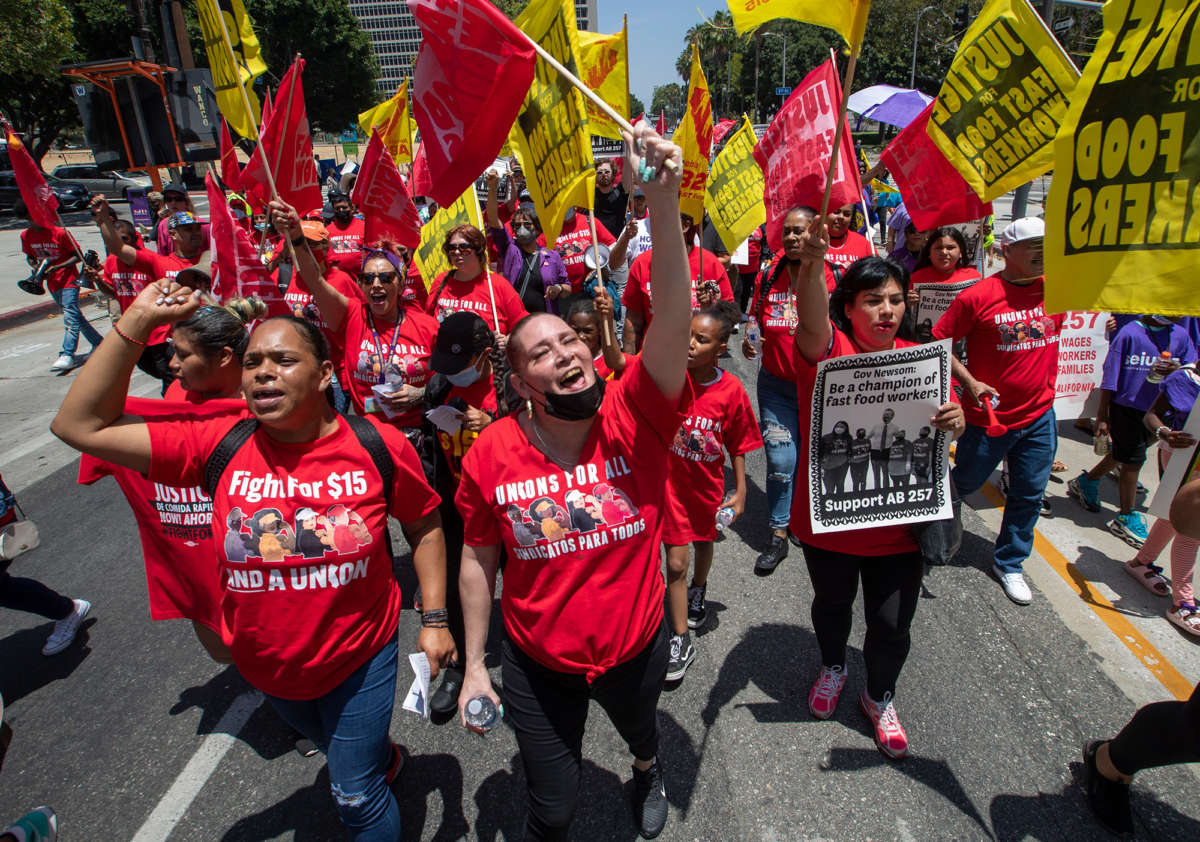In the face of fierce corporate opposition, the California Senate on Monday passed a landmark bill aimed at giving the state’s roughly 550,000 fast food workers a say over their working conditions, hours, and wages in an industry rife with abuse.
If Democratic Gov. Gavin Newsom signs it into law, the Fast Food Recovery Act (AB 257) would make California the first state in the U.S. to establish a council tasked with setting industrywide workplace standards for the fast food sector. The 10-member council would include workers and worker advocates as well as business representatives and state officials.
Newsom has not said whether he will sign the bill, but his Department of Finance argued against the legislation in a recent analysis, claiming it “could lead to a fragmented regulatory and legal environment for employers and raise long-term costs across industries.”
Union leaders strongly disagree with that assessment. Mary Kay Henry, international president of the Service Employees International Union (SEIU), said the measure “will be the most important piece of labor law to pass in decades” if it’s enacted.
“It will give 550,000 fast food workers a chance to sit down with government and their employers to decide wages and working conditions,” said Henry. “I cannot overstate how significant this is. It sets the standard for what states and cities around the country should be doing to support workers.”
BREAKING: After workers organize strikes at over 350 restaurants across the state, California’s State Senate has passed #AB257
Today is a watershed moment in the history of the labor movement; 550,000 fast food workers in CA will soon have a seat at the table with our employers pic.twitter.com/0AT2wRogTu
— Fight For 15 (@fightfor15) August 29, 2022
The bill, a product of relentless grassroots organizing by workers across the state, has predictably encountered massive, coordinated opposition from the fast food industry and the state’s restaurant sector more broadly.
In a statement Monday, the California Chamber of Commerce complained that the bill’s definition of “fast food restaurant” is “so broad that it will encapsulate far more than what we think of as traditional fast food establishments and is vague in differentiating between to-go service, counter service, and traditional sit-down restaurants.”
As the Los Angeles Times reported, corporate lobbying succeeded in weakening some aspects of the historic legislation:
One major change was the removal of a joint liability clause that would have made a corporate franchiser responsible for labor law violations of its franchisees, a provision that opponents of the measure argued would greatly discourage franchising in the state.
Another reduces the size of the governing council and the number of seats allocated to state regulators, originally seven of 13 spots. The revised 10-person council includes four seats held by fast-food franchiser and franchisee representatives and four seats held by fast-food worker representatives and advocates…
The bill establishes that legislators will have sufficient time to review and potentially block any standards set by the council, and the council has a sunset in six years, allowing legislators to evaluate its effectiveness.
The new version of the bill also limits the minimum wage from rising above $22 an hour in 2023.
Proponents of the measure emphasize that it is a nod in the direction of sectoral bargaining, whereby employees and management negotiate pay, benefits, and other workplace matters on an industrywide basis rather than company by company.
“Under U.S. law, most workers have the right on paper to unionize and collectively bargain with their boss if a majority of their co-workers are on board. In practice, workers in industries like fast food have found that very difficult, and unionization has been plummeting for decades,” explains Bloomberg labor reporter Josh Eidelson.
“In fast food,” Eidelson continues, “SEIU is advocating state-level sectoral bargaining as an alternate form of collective bargaining, but also as a step towards winning unionization, federal labor law changes, and those long-sought nationwide agreements with the top chains.”
Recent studies and survey data help explain why worker advocates and unions are focusing their attention on California’s huge fast food industry.
An analysis published in January by UCLA and the University of California, Berkeley found that nearly two-thirds of fast food workers in Los Angeles County have experienced wage theft.
In May, the Fight for $15 released polling data showing that 85% of California fast food workers surveyed said they’ve been victim to “at least one form of wage theft.”
And earlier this month, Harvard and the University of California, San Francisco observed in a joint study that California fast food workers “earn 85 cents on the dollar compared with their counterparts in other service sector jobs and would have to work six extra hours each week just to reach parity with the average earnings of other service sector workers.”
“Compared with other service sector workers,” the study concludes, “California fast food workers stand out with the lowest hourly wages and the least predictable work schedules. These low wages leave fast food workers far below the minimum living wage to meet basic needs for a single adult.”
Join us in defending the truth before it’s too late
The future of independent journalism is uncertain, and the consequences of losing it are too grave to ignore. To ensure Truthout remains safe, strong, and free, we need to raise $41,000 in the next 5 days. Every dollar raised goes directly toward the costs of producing news you can trust.
Please give what you can — because by supporting us with a tax-deductible donation, you’re not just preserving a source of news, you’re helping to safeguard what’s left of our democracy.
